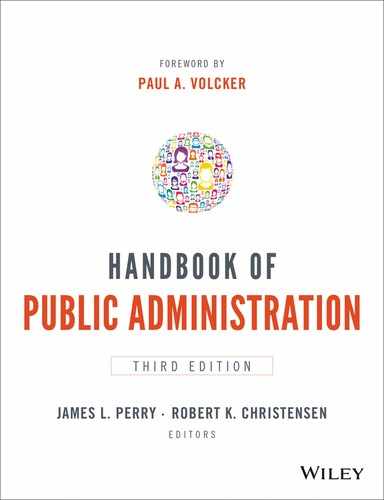Part 7
Professionalizing Public Administration Practice
Part 7 concludes this book by reflecting on what it means to be a member of the public administration profession. The chapter authors identify key professional expectations with regard to professional ethics and liability. The concluding chapter summarizes lessons from the book about effective enterprises and being an effective public administrator.
While public administration may not be considered a profession in the classic sense that law, divinity, and medicine are—it neither monopolizes specialized knowledge nor controls entry into the profession—in other respects, public administration has become very professionalized. For example, public administrators require extensive training, apply their knowledge to practical problems, provide an important service to society, subscribe to ethical codes, and belong to organizations intended to advance the services they provide. Part 7 explores the meaning and implications of professionalism in public administration.
One facet of professionalism that strikes us as particularly relevant in today's climate is that public administrators have no simple formula for making ethical choices. In chapter 32, Brian Williams provides a thoughtful menu of approaches to guide the choices. The options for public administrators range from avoiding vice to applying virtue and from compliance to external control to internal application of guiding principles. But if these and other options are to be effective, Williams argues, they must be simultaneously situated in leadership and followership. Leadership should not be underestimated, and Liza Ireni-Saban's discussion of codes of ethics in chapter 33 reaches internationally to demonstrate the critical role of institutional and professional leadership in developing “ethical competence” among public administrators
Codes of law play an important role in professionalizing the practice public administration as well. In chapter 34, Stephanie Newbold reminds public administrators that failure to abide by law may be enforceable by citizens through the courts. Public administrators may be liable for damages for maladministration from violations of due process, to unlawful appropriation of private property, to malicious prosecution. The discussion offers guidance about both potential sources for liability and how to avoid them. Returning to a common theme in this book, success in this and other areas depends on a mixture of internal and external drivers. Law as an externally imposed constraint plays an important role in ensuring some level of administrative professionalism. However, professionalism must also be internally driven through constitutional competence that is self-directed and preventative rather than externally imposed and reactive.
The ultimate goal of public administration practitioners is success at achieving results consistent with the priorities and values of modern governance. In chapter 35, we set our sights on the ultimate goal of this book: advancing effective governance. What are the attributes, characteristics, or qualities of effective governance? How can we recognize and train effective public administrators? What qualities, attributes, skills, and behaviors are characteristic of effective public administrators? In answering these questions, we synthesize insights shared throughout the book.
As the contributors to the book have emphasized both explicitly and implicitly, effective public administration is a function of both institutions and people. In chapter 35, we seek to highlight answers to the two “big idea” questions based on the contributions to this book: What distinguishes effective governance? and What makes an effective public administrator?
From the evidence presented by the contributors, we conclude that effective governance evolves from clear missions, shared goals, and well-coordinated collective action. It is designed with accountability in mind, measures and monitors processes and results, and is based on good stewardship of resources. These four factors together are critical for public enterprise effectiveness.
Effective enterprises also depend on effective administrators. The adage that people matter has particular potency in public service. Effective public administrators must possess a range of skills, among them technical, human, conceptual, and intrapersonal, but these skills alone are not sufficient. They must also be responsive to democratic control and concerned with results, including the moral consequences of action.
Although professionalism in public service is valued, professionalism in a traditional sense is not compatible with democratic governance. If public administration sets itself apart, it risks alienating itself from the public and its representatives. Public administrators must use their discretion and judgment to facilitate the workings of the complex machinery of government on behalf of the rights and interests of all citizens.
